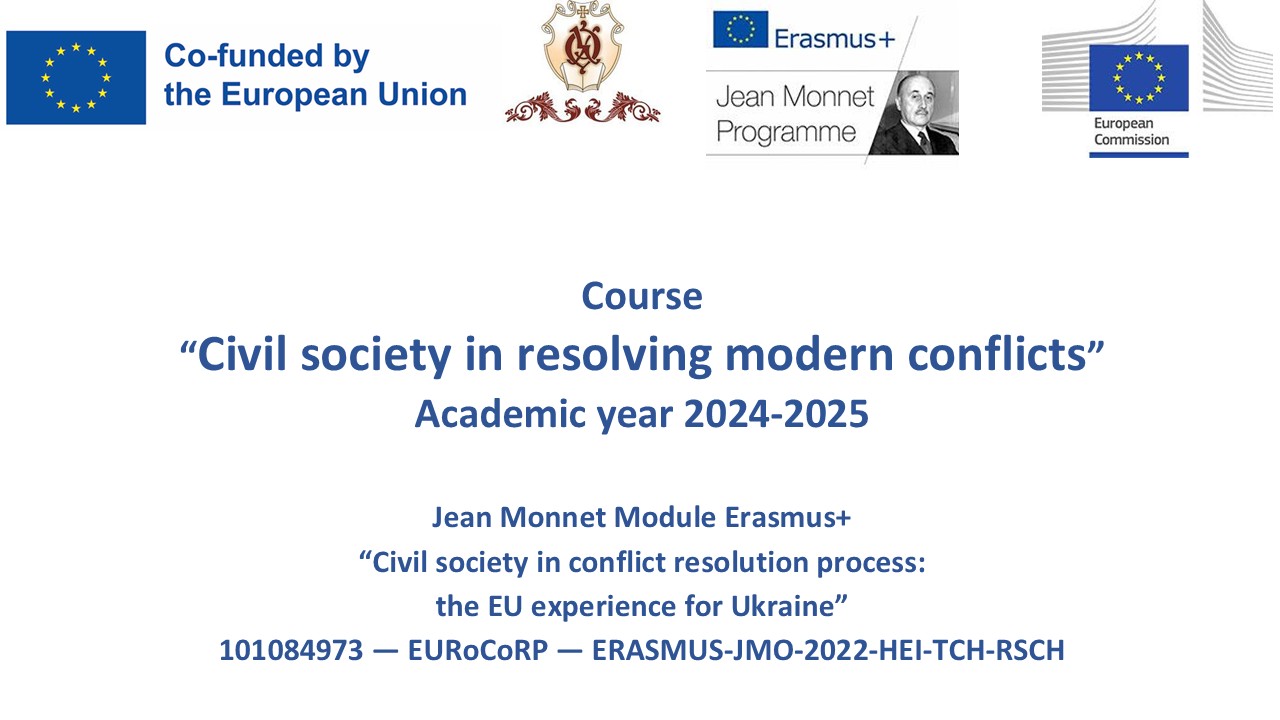From May 5 to June 23, 2025, students of Ostroh Academy took part in the certificate program “Civil Society in Resolving Contemporary Conflicts,” which is being implemented as part of the Jean Monnet project “Civil Society in Conflict Resolution Process: EU Experience for Ukraine.”
During the course, participants had the opportunity to attend 20 lectures and take part in 10 practical classes. The course was devoted to the theoretical and practical foundations of the formation and functioning of civil society in Ukraine and the European Union. Students learned about key concepts, models, legal frameworks, and institutional mechanisms for interaction between civil society and the state. Particular attention was paid to contemporary forms of civic engagement—political parties, media, volunteer and youth movements, and anti-corruption initiatives. The course provided an understanding of the role of civil society in ensuring democracy, human rights, national security, and European integration in Ukraine.
Speakers included:
- Sergiy Ishchuk, Doctor of Law, Associate Professor, Professor of the Department of Theory and History of State and Law at NAU;
- Tetiana Sydoruk, Doctor of Political Sciences, Professor, Head of the Department of International Relations at NAU;
- Dmytro Shevchuk, Doctor of Philosophy, Professor, Vice-Rector for Scientific and Pedagogical Work at NAU;
- Olena Shershnova, project coordinator, candidate of sciences in public administration, associate professor of the Department of Journalism and PR Management;
- Kateryna Yakunina, candidate of historical sciences, assistant to the rector for strategic development and quality assurance at NAU.
“This course is extremely important because it has given students a comprehensive understanding of the role of civil society in democratic processes and the development of the state. It has helped them realize how the active position of citizens can influence decision-making, control of power, and the protection of human rights. Thanks to the course, future specialists have acquired the competencies necessary for effective participation in public life and the building of a responsible society,” said Kateryna Yakunina, PhD in History, Assistant to the Rector for Strategic Development and Quality Assurance at NAU, member of the EURoCoRP team.
After completing the course, participants gained in-depth knowledge about civil society as a key element of modern democracy and an effective tool for public participation and control. Through 20 thematic modules, they explored the theoretical foundations of civil society, its structure, values, legal and institutional foundations, and mechanisms for interacting with state bodies.
Participants analyzed contemporary forms of civic engagement, from volunteer and anti-corruption movements to youth initiatives, protest activities, and information advocacy. Particular attention was paid to the role of the media as a control resource, issues of self-organisation, identity formation, ensuring the right to peaceful assembly, and security challenges in the context of hybrid threats.
The course also familiarized participants with international standards of civil society activity, the practices of the European Court of Human Rights, and the experience of the EU and Eastern Partnership countries, which made it possible to assess Ukraine’s place in the broader context of democratic transformations.
“As a result of the training, participants not only deepened their understanding of the key principles of civil society, but also acquired practical skills for effective participation in public life, public policy-making, and strengthening democratic processes in Ukraine,” noted Dmytro Shevchuk, Doctor of Philosophy, Professor, Vice-Rector for Scientific and Pedagogical Work.
We would like to remind you that the project “Civil Society in Conflict Resolution Process: EU Experience for Ukraine” (101084973 — EURoCoRP — ERASMUS-JMO-2022-HEI-TCH-RSCH) is being implemented by the National University of Ostroh Academy with co-financing from the European Union and aims to promote the values of EU civil society in the process of conflict resolution and raise awareness of contemporary hybrid conflicts.

